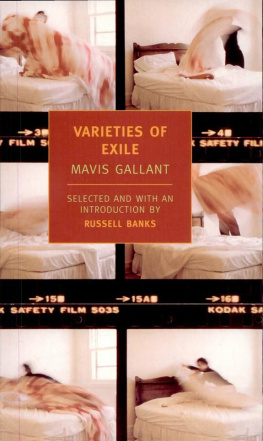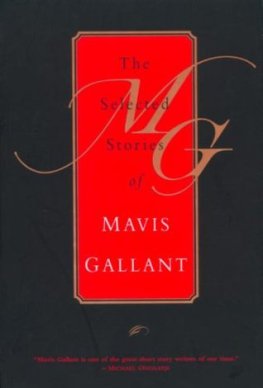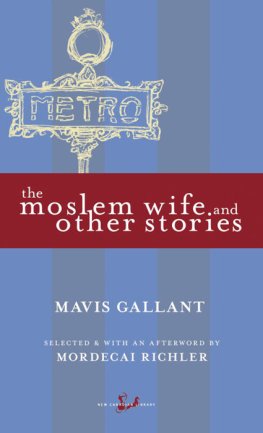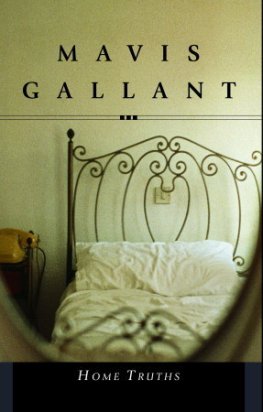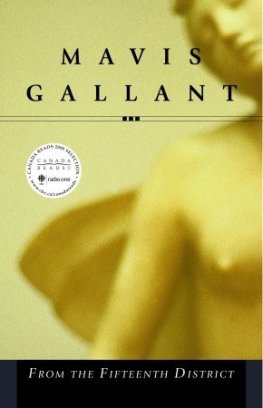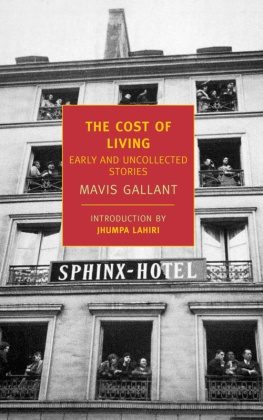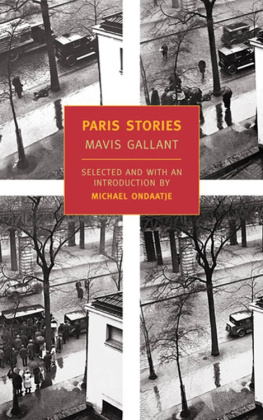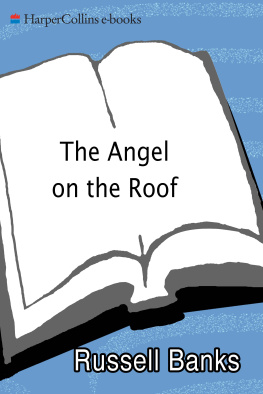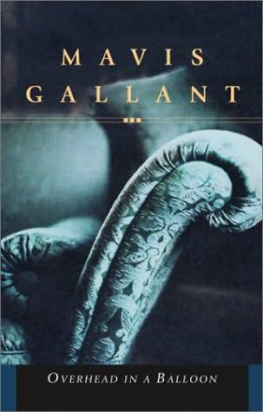NEW YORK REVIEW BOOKS
CLASSICS
VARIETIES OF EXILE
MAVIS GALLANT was born in Montreal and worked as a journalist at The Standard before moving to Europe to devote herself to writing fiction. After traveling extensively she settled in Paris, where she still resides. Her stories first appeared in The New Yorker in 1951. Paris Stories, selected and introduced by Michael Ondaatje, was published by New York Review Books Classics in 2002. Varieties of Exile is her fourteenth book to appear in this country.
RUSSELL BANKS is a novelist and short story writer. His most recent works are Cloudsplitter, a novel, and The Angel on the Roof: New and Selected Stories. He is president of the International Parliament of Writers and a member of the American Academy of Arts and Letters. He lives in upstate New York.
VARIETIES OF EXILE
Stories
MAVIS GALLANT
Selected and with an introduction by
RUSSELL BANKS
New York Review Books

New York
Contents
Introduction
I N A CHARACTERISTIC mingling of modesty and fierce pride, Mavis Gallant has said that one of the hardest things in the world is to describe what happened next. Its hard because of the value- and emotion-laden nature, not just of memory, but of human consciousness itself. Though nothing truly escapes us, memory and mind from the moment of our birth are notoriously, almost hopelessly, selective, elliptical, and inventive. And memory and mind, for expression, perhaps for their very existence, depend upon language than which, of course, there is no more evasive and deceptive a medium. Now in her eighties, Gallant has spent a long lifetime doing that hardest thing, describing what happened next, in stories that are not only moving and powerful but true to memory and mind. Born and raised bilingual in French-speaking Quebec and residing most of her adult life in France, Gallant chose to write in English, and in it fewer than a handful of living story writers are her equal: William Trevor, and her countrywoman Alice Munro, perhaps, and since the death of Eudora Welty no American that I can think of.
The tension and sometimes outright conflict between remembered and felt experience on the one hand and, on the other, the known truth of what happened lies at the heart of all great short stories. Its the argument that generates plot and structure, which, finally, gives a story meaning. Since Gogol and Chekhov, the flexible and still rapidly evolving form of the short story has unfolded that argument, and in doing so it has universalized and dignified the experience, the pain and sorrow and desire and fear, of the ordinary, solitary man, woman, and child. It has extricated the isolato from the masses and made Everyman. Frank OConnor called the modern short story the lonely voice, and more than any other literary form it speaks to and for every human being who thinks of him- or herself as alone, cut off from God, and counted as unimportant and unworthy of attention except when considered en masse. It is, in a sense, the most democratic literary form. And it is in this tradition that Mavis Gallant has made herself a master.
Her stories follow no formula and obey no laws other than Robert Musils one law of life, and that is the law of narrative order. Which is to say, they are digressive, regres-sive, and circular; they leap forward in time one minute and linger in pockets of loss the next; they ruminate and fulminate and explicate. There are asides, self-reflexive inquiries, and rapid shifts in point of view none of which stop or hinder the forward motion of the story. Quite the opposite; they keep the story flowing, like a meandering stream crossing a broad plain to the sea, like consciousness. But Gallants intent is always to dramatize conscious-ness, not merely to portray it. Consequently, her stories are as difficult to describe or to reduce to a synopsis as any truly lived experience is not because of their variety or obscurity (her stories are never obscure) or some esoteric quality (her characters, settings, situations, and language are always instantly familiar, intimate, and homegrown, whether planted in Montreal, an Eastern Township village, Paris, Moscow, Florida, or the French Mediterranean), but because of their economy and precision and the sublime integration and inseparability of their elements form, structure, content, and style.
In terms of locale, her stories, perhaps as a reflection of her somewhat bifurcated life, can be divided roughly between those that take place in Europe, usually Paris, and those set in Canada, usually Montreal and its nearby environs. I have for personal reasons (I am half Canadian with three Canadian grandparents and grew up and live today just south of the border) an abiding affection if not an outright preference for the North American stories, if only because Gallant has attended there to lives that are familiar and matter greatly to me and rarely make it into literature: an adolescent girl, nearly crushed by the claustrophobic religious culture of her family, refusing to exchange her spirit for her soul (The Chosen Husband); a boy, abandoned by his feckless dad, but obliged to care for the old man when, years later, he turns up dying in France (The End of the World); a grown daughter, returning to the city of her childhood, tracking the secret sources of her gauzy memories of her father and mother and their torn marriage (Voices Lost in Snow). None of these characters has money or property or much education; none of them is secure in society. Characters and situations like these seem peculiarly American, North American. Its not easy to imagine them in the hands of a British or European or Latin American writer. I fear they would be treated far less kindly.
In Gallants stories, the conflicts, obsessions, and concerns the near-impossibility of gaining personal freedom without inflicting harm on those whom you love and who love you; the difficulty of forgiving a cruel and selfish parent with-out sentimentalizing him; or the pain of failed renewal are limned with an affectionate irony and generated by a sincere belief in their ultimate significance, significance not just for the characters who embody them, but for the author and, presumably, the reader as well. Such themes and perspectives as these have characterized the work of the best American story writers of the last half-century, from John Cheever to Raymond Carver to Lorrie Moore, and the best Canadians, from Alice Munro to Margaret Atwood to Clark Blaise. We respond to them on both sides of the long, porous border between our two nations with the same sad shock of self-recognition that we feel contemplating the imagery and atmosphere of a painting by Edward Hopper or a Duke Ellington orchestral suite. There is stringently expressed nostalgia, and then a bite, a redemptive edginess, that by undercutting the nostalgia gives it dignity and makes it worthy of our attention and admiration. As Samuel Beckett noted, There is no escape from yesterday because yesterday has deformed us, or been deformed by us. The memory doesnt simply linger on; it instructs the present and prepares for the future that will sabotage it.
Here is Gallant:
The end of the afternoon had a particular shade of color then, which is not tinted by distance or enhancement but has to do with how streets were lighted. Lamps were still gas, and their soft gradual blooming at dusk made the sky turn a peacock blue that slowly deepened to marine, then indigo. This uneven light falling in blurred pools gave the snow it touched a quality of phosphorescence, beyond which were night shadows in which no one lurked. There were few cars, little sound. A fresh snowfall would lie in the streets in a way that seemed natural. Sidewalks were dangerous, casually sanded; even on busy streets you found traces of the icy slides childrens feet had made. The reddish brown of the stone houses, the curve and slope of the streets, the constantly changing sky were satisfactory in a way I now realize must have been aesthetically comfortable. This is what I saw when I read city in a book; I had no means of knowing that city one day would also mean drab, filthy, flat, or that city blocks could turn into dull squares without mystery.
Next page
